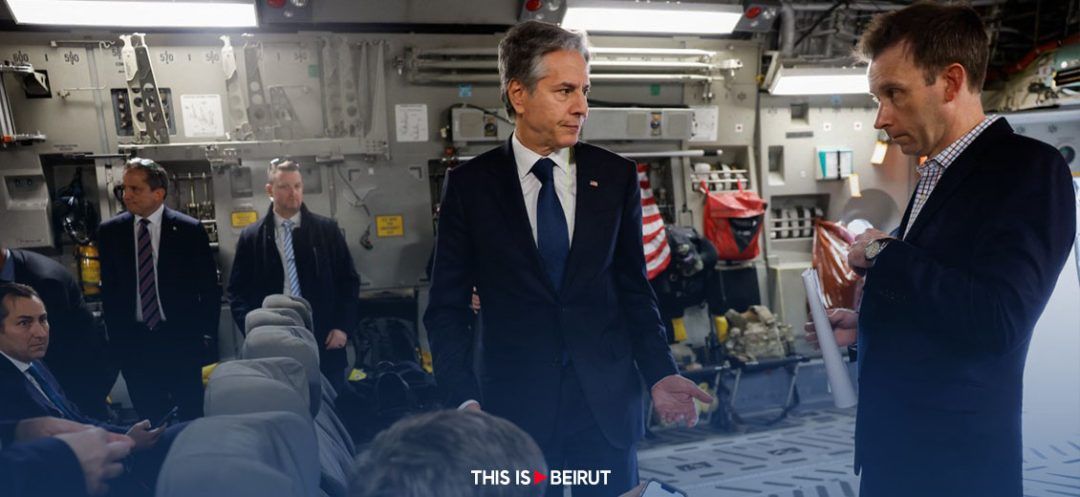- Home
- War in the Middle East
- Arab-Israeli Rapprochement Would Isolate Iran, Says Blinken

©(Evelyn HOCKSTEIN, AFP)
US Secretary of State Antony Blinken asserted that a closer relationship between Israel and the Arab states would bring about lasting isolation of Iran, during his visit to Cairo on Thursday January 11. Mr Blinken was speaking at the end of a tour of the Middle East aimed at calming tensions between Israel and Iran's allies.
Closer ties between Israel and the Arab states, the majority of which do not recognize Israel, would be "the best way to isolate Iran and its supporters", declared US Secretary of State Antony Blinken in Cairo on Thursday.
"Israel's security and (regional) integration are linked to opening the way to a Palestinian state", he added, in the latest stage of his diplomatic marathon in the Middle East, devoted to the conflict in Gaza between Israel and the Palestinian movement Hamas.
By 2020, three new Arab countries - Bahrain, the United Arab Emirates and Morocco - had signed agreements with Israel, following on from Egypt and Jordan in 1979 and 1994.
The Gaza war, triggered by the unprecedented Hamas attack on Israeli soil on October 7, interrupted a similar process of normalization begun between Israel and Saudi Arabia.
Today, when the Israeli bombardment of Gaza has claimed more than 23,400 lives, the majority of them women, teenagers and children, according to the Gaza Ministry of Health, "the conflict must end for the situation to change", pleaded Mr. Blinken.
In this respect, he noted that Israel had "demobilized a significant number of forces" deployed in the besieged Palestinian territory, where Hamas took power in 2007.
This week, Mr. Blinken claimed to have secured a reform of the Palestinian Authority from Palestinian President Mahmoud Abbas, Hamas's historic rival whose authority extends only to parts of the occupied West Bank. This is a sine qua non condition laid down by the Americans for the reunification of the Palestinian Territories, while Israel has vowed to eradicate Hamas in the Gaza Strip.
However, the terms of this "reform" are unclear, while many voices have been raised for years in the Palestinian Territories against this power, which was only intended to be interim but which continues - without elections for years - for lack of a horizon for the creation of the Palestinian state.
Arriving from Israel, Mr. Blinken met with Egyptian President Abdel Fattah al-Sissi. He then returned to the United States after visiting nine countries, including Turkey and Saudi Arabia, as well as the occupied West Bank.
Mr. Blinken, who on Wednesday accused Iran of "supporting" and "encouraging" Iranian-backed Houthi attacks in the Red Sea, nevertheless said in Cairo that he did not believe "the conflict is escalating".
In his view, none of the regional players wants it to: "Israel does not. Nor does Lebanon. And, in fact, I don't think it's what Hezbollah wants either", referring to the Iranian-backed Lebanese armed movement.
Exchanges of fire between Israel and Hezbollah, an ally of Hamas, have taken place almost daily on the Israeli-Lebanese border since the start of the war.
At the end of his regional tour, Mr. Blinken declared that the Israeli-Arab rapprochement he advocates would isolate Teheran "and its supporters who are causing so much harm (to the US) and just about everyone else in the region", in reference to attacks by Yemen's Houthi rebels on ships in the Red Sea. "I think this vision is very clear to many leaders in the Middle East," he insisted.
With AFP
Closer ties between Israel and the Arab states, the majority of which do not recognize Israel, would be "the best way to isolate Iran and its supporters", declared US Secretary of State Antony Blinken in Cairo on Thursday.
"Israel's security and (regional) integration are linked to opening the way to a Palestinian state", he added, in the latest stage of his diplomatic marathon in the Middle East, devoted to the conflict in Gaza between Israel and the Palestinian movement Hamas.
By 2020, three new Arab countries - Bahrain, the United Arab Emirates and Morocco - had signed agreements with Israel, following on from Egypt and Jordan in 1979 and 1994.
The Gaza war, triggered by the unprecedented Hamas attack on Israeli soil on October 7, interrupted a similar process of normalization begun between Israel and Saudi Arabia.
Today, when the Israeli bombardment of Gaza has claimed more than 23,400 lives, the majority of them women, teenagers and children, according to the Gaza Ministry of Health, "the conflict must end for the situation to change", pleaded Mr. Blinken.
In this respect, he noted that Israel had "demobilized a significant number of forces" deployed in the besieged Palestinian territory, where Hamas took power in 2007.
This week, Mr. Blinken claimed to have secured a reform of the Palestinian Authority from Palestinian President Mahmoud Abbas, Hamas's historic rival whose authority extends only to parts of the occupied West Bank. This is a sine qua non condition laid down by the Americans for the reunification of the Palestinian Territories, while Israel has vowed to eradicate Hamas in the Gaza Strip.
"Possible to Isolate Tehran"
However, the terms of this "reform" are unclear, while many voices have been raised for years in the Palestinian Territories against this power, which was only intended to be interim but which continues - without elections for years - for lack of a horizon for the creation of the Palestinian state.
Arriving from Israel, Mr. Blinken met with Egyptian President Abdel Fattah al-Sissi. He then returned to the United States after visiting nine countries, including Turkey and Saudi Arabia, as well as the occupied West Bank.
Mr. Blinken, who on Wednesday accused Iran of "supporting" and "encouraging" Iranian-backed Houthi attacks in the Red Sea, nevertheless said in Cairo that he did not believe "the conflict is escalating".
In his view, none of the regional players wants it to: "Israel does not. Nor does Lebanon. And, in fact, I don't think it's what Hezbollah wants either", referring to the Iranian-backed Lebanese armed movement.
Exchanges of fire between Israel and Hezbollah, an ally of Hamas, have taken place almost daily on the Israeli-Lebanese border since the start of the war.
At the end of his regional tour, Mr. Blinken declared that the Israeli-Arab rapprochement he advocates would isolate Teheran "and its supporters who are causing so much harm (to the US) and just about everyone else in the region", in reference to attacks by Yemen's Houthi rebels on ships in the Red Sea. "I think this vision is very clear to many leaders in the Middle East," he insisted.
With AFP
Read more



Comments